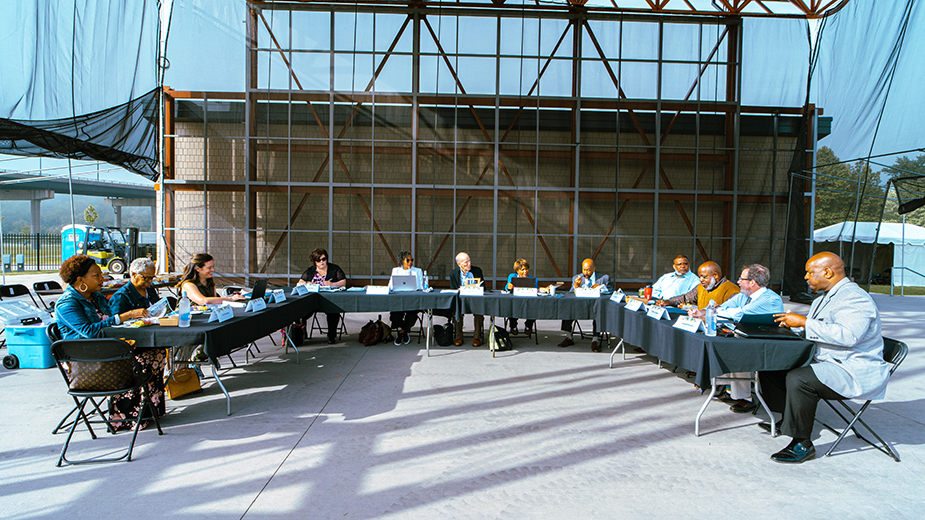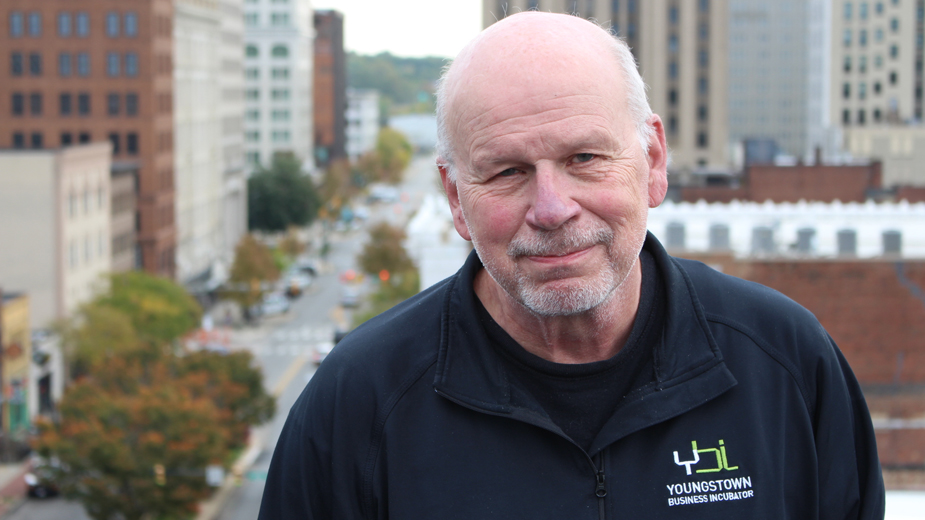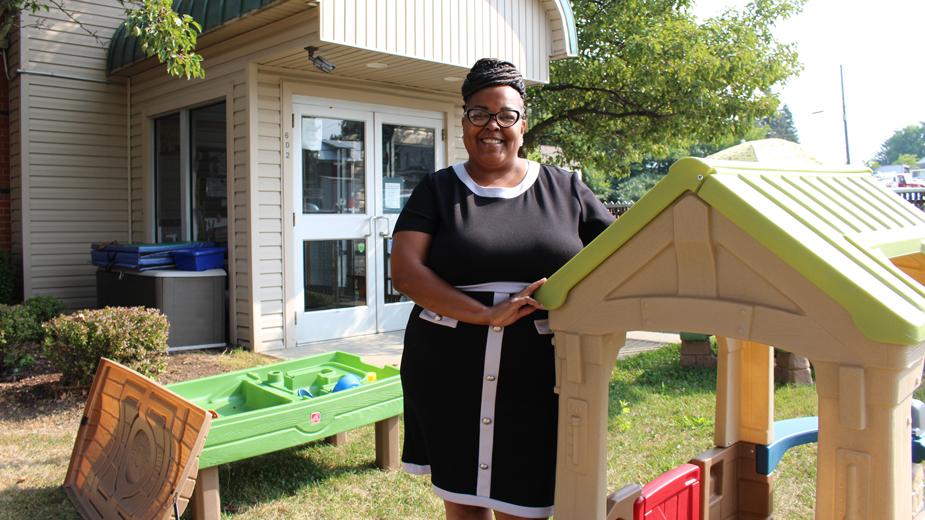Down Syndrome Association Was Born from Need
BOARDMAN, Ohio — Seven years ago, Sandee Timmerman’s niece came to her with what had become a bittersweet announcement: her newborn son had Down syndrome.
“My husband and I screamed. We were so excited,” recalled Timmerman.
“Then I said, ‘Wait a minute. I’m sorry. How are you doing with this?’ ”
But her initial excitement proved to be the correct response. “My niece said, ‘Please don’t stop Aunt Sandee. Don’t stop.’ ”
Timmerman recalls her niece explaining what should be a joyous occasion – the announcement of her child’s birth – had become a somber affair, full of condolences and uncomfortable silence.
“I still had a baby. He’s still a human being,” she recalls her niece saying.
Timmerman’s niece had the benefit of seeing what the possibilities were for a person with Down syndrome because she grew up around Timmerman’s four adopted children, all of whom have the condition. All four have become productive members of society, in part, because of the assistance they received from the Down Syndrome Association of the Valley.
When Michele Jones gave birth in 2004 to a baby girl she named Lauren, and who has Down syndrome, the services of an organization like the Down Syndrome Association weren’t available to her. Neither was the hope provided by seeing the example of another family in her situation.
“There were resources in large cities, but as a mother you try to find out as much as you can about Down syndrome,” says Jones, the co-founder and president of the association.
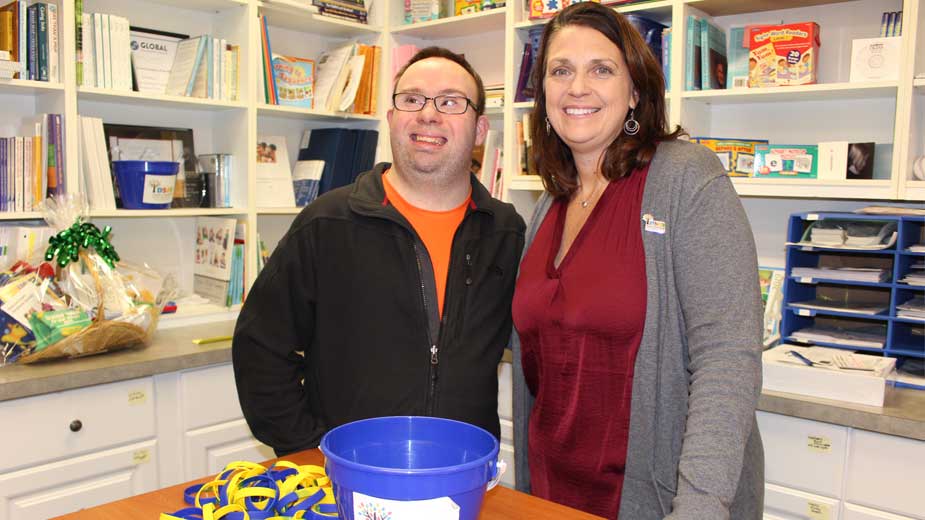
Jones and her husband weren’t new to parenting – Lauren is their third child – and both have a medical background. Jones is a pharmacist and her husband was a physician.
Still, as they pondered how to help Lauren navigate through life, they found information hard to come by. Trips to Cleveland, Pittsburgh and Columbus in search of resources became common.
“Probably the most hopeful thing that ever happened was when we were meeting with a family in Columbus and they had a child who was 5 or 6 and had Down syndrome,” recalls Jones.
“What was wonderful was to see what the picture could look like when a person with Down syndrome is that age.”
Providing that picture for families facing similar challenges became the driving force behind Jones’ efforts to establish the Down Syndrome Association of the Valley.
In 2007, she and a few other families organized a picnic, which took place “on the coldest, rainiest day in August,” to see what the needs were in the community.
“And from there it really blossomed,” she says.
What Jones found was a large community in search of the same information as she was.
Heidi Herman of Lake Milton had questions about her 2-year-old son, Curtis. “Where do I go when it comes time for preschool?” she wondered.
Nancy Holub of Newton Falls searched for information to help her 10-year-old son Mike as she attended informational meetings held by the Trumbull County Board of Developmental Disabilities.
“But it wasn’t anything specific to Down syndrome. It was for anyone with disabilities in Trumbull county,” she says.
Like Jones, they sought reassurance that their children were going to be OK.
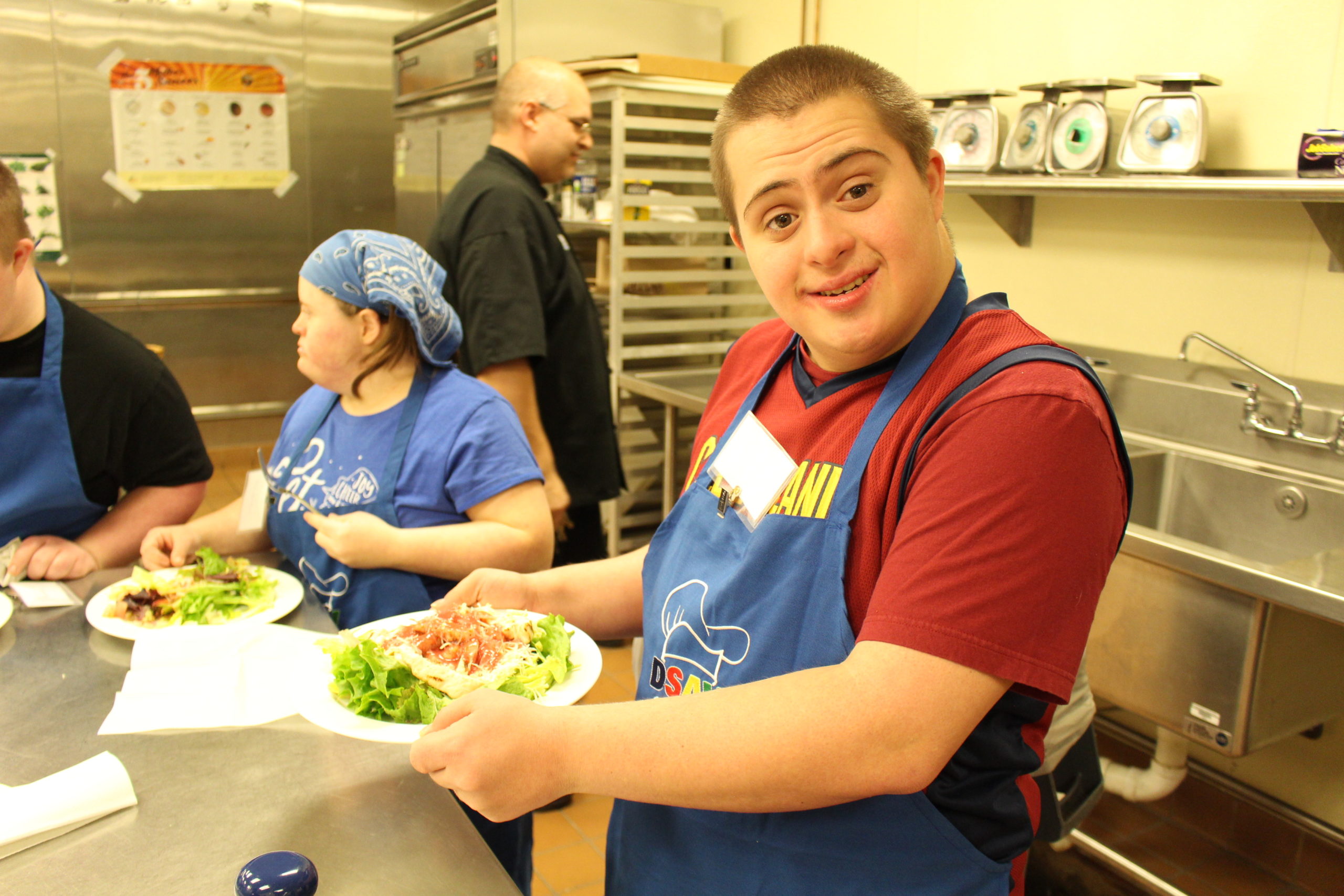
“You want all your children to be productive members of society,” says Jones. “What we try to provide is an environment that gives them those enriching experiences and the opportunity to be all they can be.”
Down Syndrome Association became a 501(c)3 nonprofit in 2007 and the founding members began meeting regularly in area libraries.
Then, in 2009, the association received a grant from the Hine Memorial Fund, administered by the Youngstown Foundation. The funding enabled it to open the Down Syndrome Center for Success at 945 Boardman-Canfield Road in Boardman.
Today, the space is a hub for all the information, resources and programming provided by the association.
“This room is very versatile,” says Sharon Roncone as she walks through the center.
“We change it from a yoga studio, we do music and movement, we use it for stories. We also set it up with desks and have classes in here,” she says.
Herman says the center has been an invaluable resource for her family. “If parents have questions they can always call the office,” she says.
Roncone, the association’s director of marketing, says the center is also home to one of the organization’s best tools for outreach: the lending library.
The library is available to all members of the association, with books that cover a variety of topics on the disorder.
“That’s really beneficial. I’ve checked books out several times,” says Herman.
But a lot of what the association does takes place outside the center in the community. It operates more than a dozen programs for its members, focusing on everything from fitness to social interaction to education.
“We’ve found out that families want additional programming. They want additional things out in their communities,” says Jones.
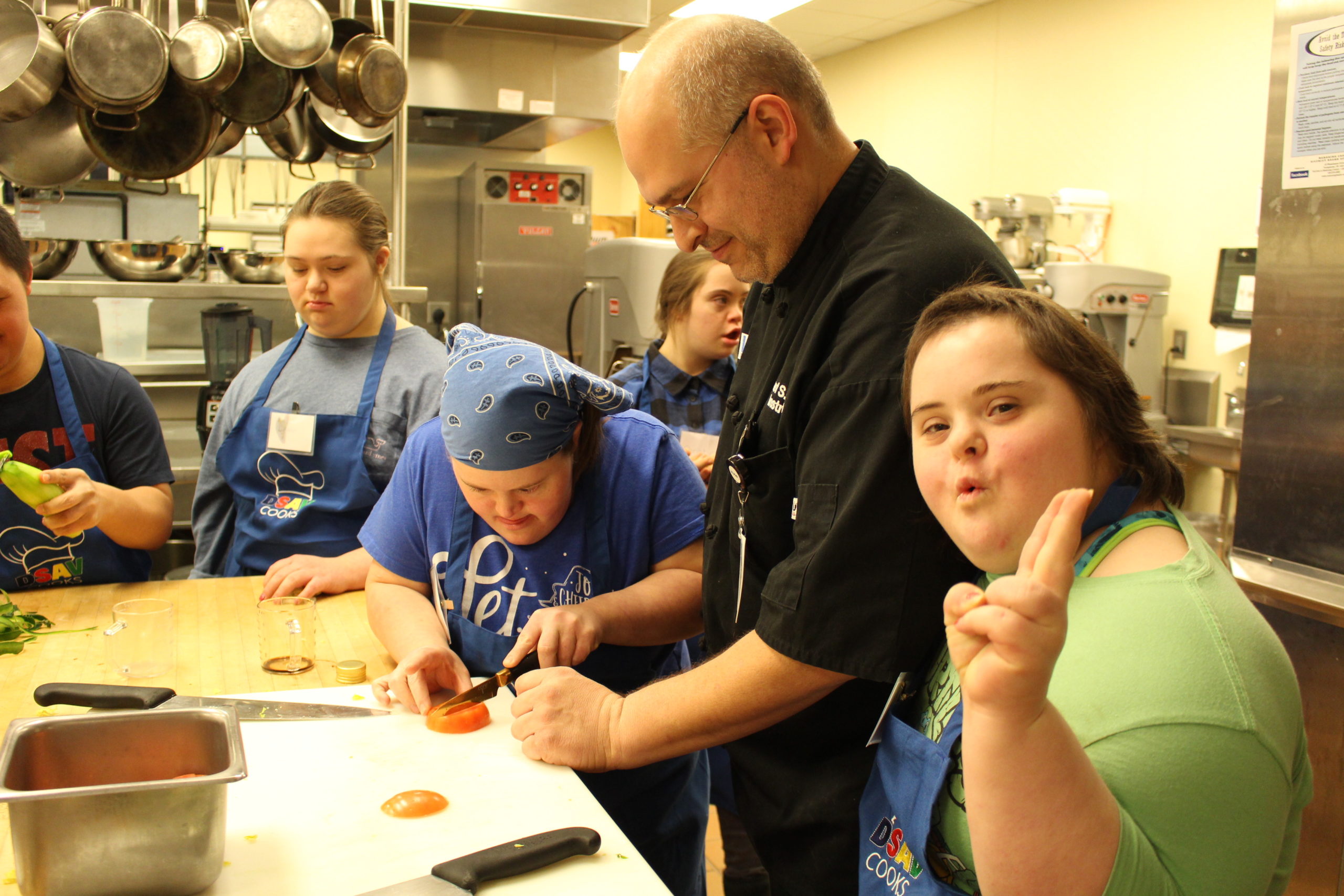
Mike Halub, now 19, enjoys the association’s iCan Shine Bike Camp.
Curtis Herman, now 15, takes part in its tennis and swimming programs.
“We live out in Lake Milton and we have a lake, so he has learned to swim, which is a challenge for our kids,” says his mother.
Mike and Curtis also attend the DSAV Cooks classes at the Mahoning County Career and Technical Center, where they learn the basics of cooking and how to make healthful meals.
Jones says their programming is designed to “connect families,” and covers the “entire lifespan of an individual with Down syndrome.”
For expectant parents, DSAV provides prenatal and post-birth support. “When a new baby is born with Down syndrome, hospital social workers will reach out to us with the permission of the family and then we become involved,” says Jones.
DSAV also provides family mentoring, informational lectures and family nights out.
One of the highlights of every year is the annual DSAV Christmas Party.
“Families dress up, Santa comes, we give them dinner, and it’s just a nice event for families who might not feel welcome otherwise,” Jones says.
The association has an annual budget of about $100,000, with funding coming from grants, corporate sponsorships and fundraisers, the biggest of which is the annual Buddy Walk at Eastwood Field.
The first Buddy Walk held by DSAV took place at the Shops at Boardman Park in 2008 and drew a few hundred people, Jones says.
This year’s event, scheduled for Sept. 20, is expected to have more than 2,500 participants.
The DSAV Buddy Walk is a licensed event through the National Down Syndrome Society, and the only one held in the area.
“That is the day that our loved ones with Down syndrome are the stars,” says Jones.
The Down Syndrome Association of the Valley operates locally with three part-time employees and serves about 300 families in eastern Ohio and western Pennsylvania.
Because of the success of fundraisers such as the Buddy Walk, Jones says DSAV is able to offer all of its programming for free to members in 2020.
“Individuals with Down syndrome are capable. It just takes them a little bit longer to do what they need to do,” she says.
Member families can also apply for grants through DSAV to help cover costs such as medical expenses that might not be covered by insurance. To date, the association has distributed $106,000 to families.
The list of accomplishments and the rapid growth of the association is surprising, even to Jones, who is quick to deflect credit, insisting that DSAV is a “group effort,” even as she refers to it as her “baby.”
What she’s proudest of, she says, is the impact DSAV has had on its members, and “seeing how far they’ve come.”
Many who came to DSAV as infants are now getting ready to graduate or have already left school and are employed.
Curtis Herman is in the ninth grade at Jackson Milton High School.
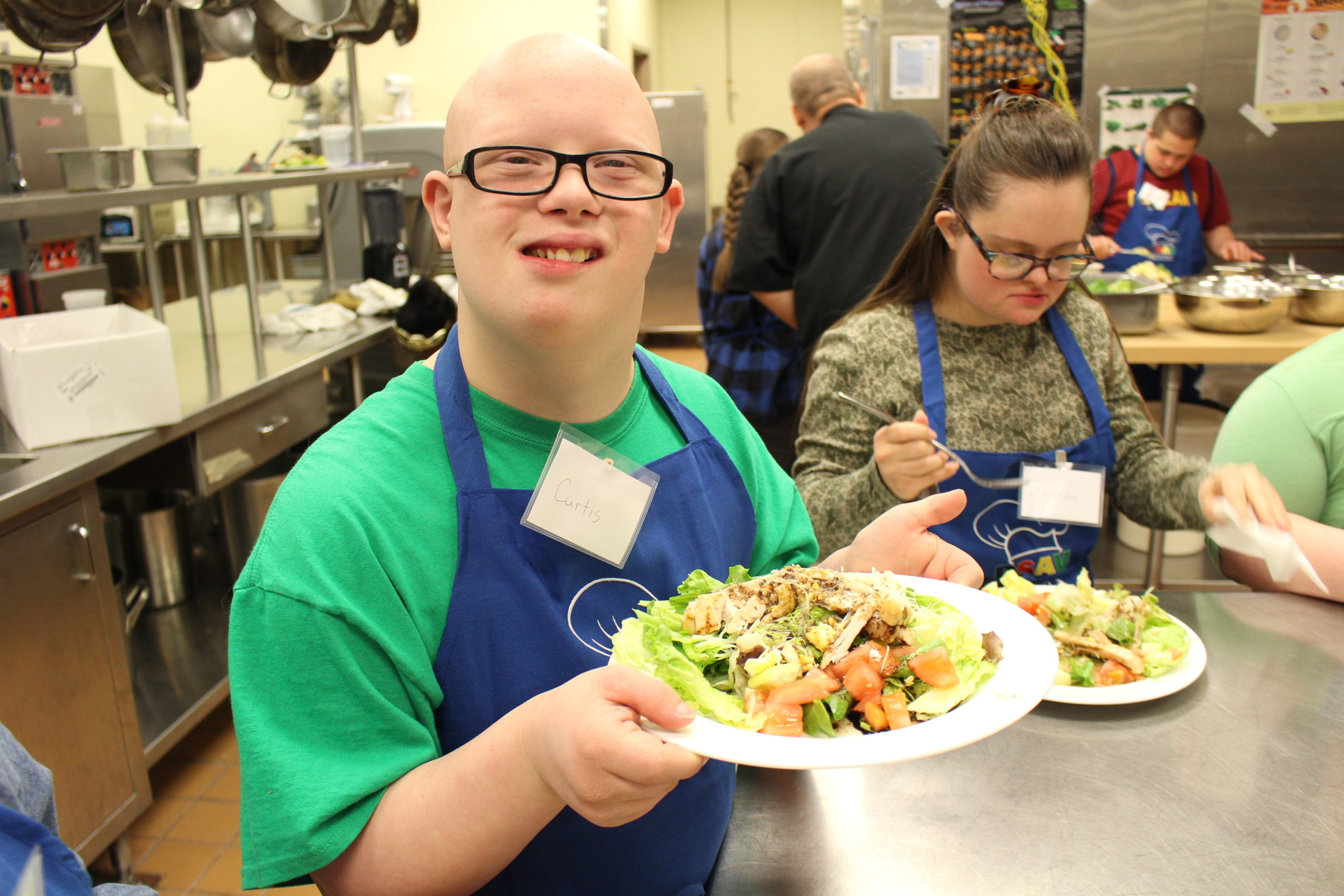
Mike Halub is enrolled in the career exploration program at the Trumbull Career and Technical Center.
But more than that, they are both models of what individuals with Down syndrome are capable of if given the opportunity, says Jones.
“What it does is it gives families hope. It gives them the ability to see what 10 years in the future might look like.”
And it helps ensure that the birth of a baby with Down syndrome, like the birth of any baby, is cause for celebration.
How You Can Help
Membership in the Down Syndrome Association of the Valley is free to anyone “who wants to make a difference in the life of someone who has Down syndrome,” says Michele Jones, co-founder and president of the association.
Volunteers, educators, and health care and medical professionals can register to become a member at the organization’s website, DSAV.org.
The association also welcomes businesses and organizations to become corporate sponsors for its fundraising events, which include the annual Buddy Walk of the Valley. This year, the Buddy Walk will take place Sept. 20 at Eastwood Field in Niles.
Corporate sponsorships as well as individual donations can be made at DSAV.org, or you can visit the center at 945 Boardman-Canfield Road during business hours.
The Down Syndrome Association of the Valley is an affiliate member of the National Down Syndrome Society, the National Down Syndrome Congress and Down Syndrome Affiliates in Action.
Copyright 2024 The Business Journal, Youngstown, Ohio.
